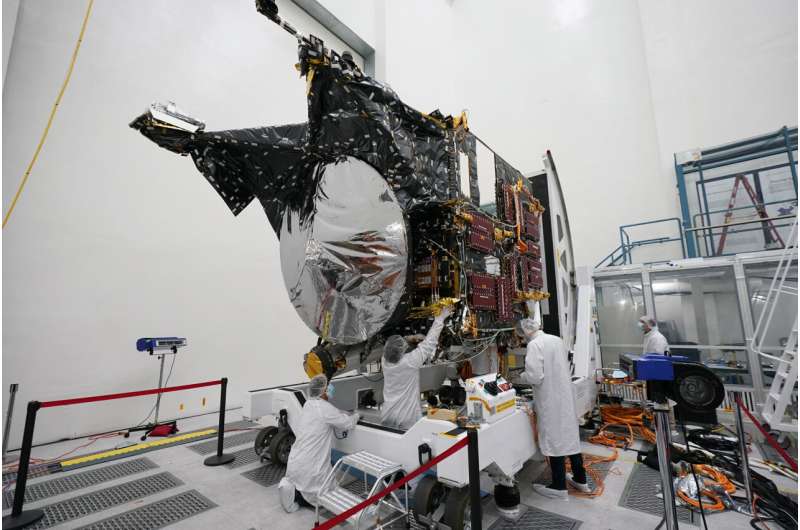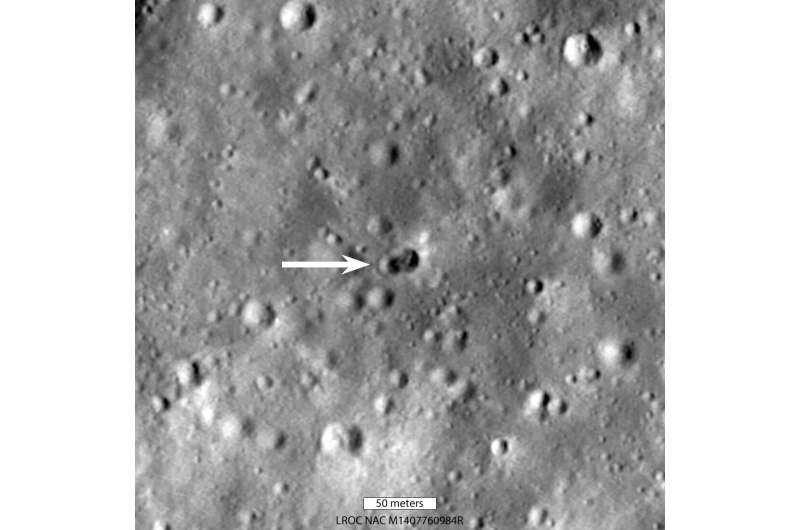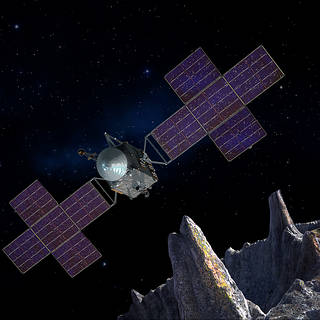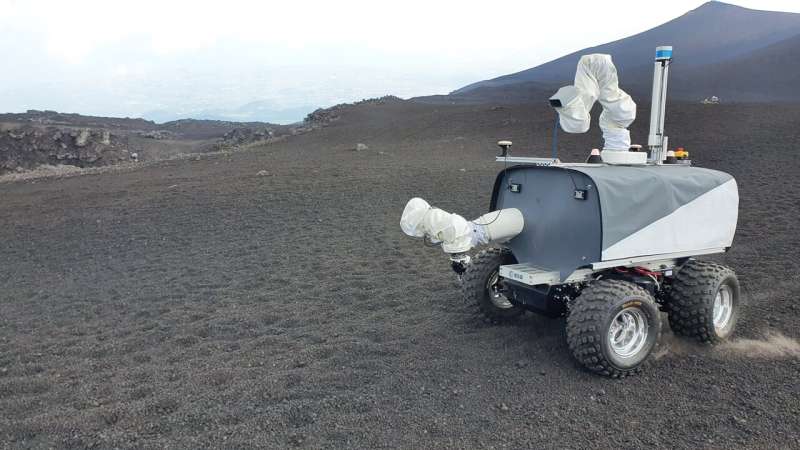
Copernical Team
Arecibo Observatory scientists help unravel surprise asteroid mystery
 When asteroid 2019 OK suddenly appeared barreling toward Earth on July 25, 2019, Luisa Fernanda Zambrano-Marin and the team at the Arecibo Observatory in Puerto Rico jumped into action.
After getting an alert, the radar scientists zoned in on the asteroid, which was coming from Earth's blind spot - solar opposition. Zambrano-Marin and the team had 30 minutes to get as many radar readings a
When asteroid 2019 OK suddenly appeared barreling toward Earth on July 25, 2019, Luisa Fernanda Zambrano-Marin and the team at the Arecibo Observatory in Puerto Rico jumped into action.
After getting an alert, the radar scientists zoned in on the asteroid, which was coming from Earth's blind spot - solar opposition. Zambrano-Marin and the team had 30 minutes to get as many radar readings a NASA Announces Launch Delay for Its Psyche Asteroid Mission
 An independent assessment team will review possible options for next steps, including estimated costs. NASA announced Friday the Psyche asteroid mission, the agency's first mission designed to study a metal-rich asteroid, will not make its planned 2022 launch attempt.
Due to the late delivery of the spacecraft's flight software and testing equipment, NASA does not have sufficient time to c
An independent assessment team will review possible options for next steps, including estimated costs. NASA announced Friday the Psyche asteroid mission, the agency's first mission designed to study a metal-rich asteroid, will not make its planned 2022 launch attempt.
Due to the late delivery of the spacecraft's flight software and testing equipment, NASA does not have sufficient time to c Lunar Reconnaissance Orbiter spots rocket impact site on Moon
 Astronomers discovered a rocket body heading toward a lunar collision late last year. Impact occurred March 4, with NASA's Lunar Reconnaissance Orbiter later spotting the resulting crater. Surprisingly the crater is actually two craters, an eastern crater (18-meter diameter, about 19.5 yards) superimposed on a western crater (16-meter diameter, about 17.5 yards).
The double crater was unex
Astronomers discovered a rocket body heading toward a lunar collision late last year. Impact occurred March 4, with NASA's Lunar Reconnaissance Orbiter later spotting the resulting crater. Surprisingly the crater is actually two craters, an eastern crater (18-meter diameter, about 19.5 yards) superimposed on a western crater (16-meter diameter, about 17.5 yards).
The double crater was unex NASA asteroid mission on hold due to late software delivery

NASA's Lunar Reconnaissance Orbiter spots rocket impact site on moon

Astronomers discovered a rocket body heading toward a lunar collision late last year. Impact occurred March 4, with NASA's Lunar Reconnaissance Orbiter later spotting the resulting crater. Surprisingly the crater is actually two craters, an eastern crater (18-meter diameter, about 19.5 yards) superimposed on a western crater (16-meter diameter, about 17.5 yards).
The double crater was unexpected and may indicate that the rocket body had large masses at each end. Typically a spent rocket has mass concentrated at the motor end; the rest of the rocket stage mainly consists of an empty fuel tank.
NASA Announces Launch Delay for Psyche Asteroid Mission
 NASA announced Friday that the Psyche asteroid mission – the agency’s first mission designed to study a metal-rich asteroid – will not make its planned 2022 launch attempt.
NASA announced Friday that the Psyche asteroid mission – the agency’s first mission designed to study a metal-rich asteroid – will not make its planned 2022 launch attempt. Image: Lunar science stirring on Mount Etna

This image comes to you from Mount Etna, Sicily, where a lunar analog study focusing on robotic exploration is currently unfolding.
The project—named the ARCHES Space-Analog Demonstration—is a multi-agency, multi-robot event brought to life by the German Aerospace Center DLR, and featuring significant ESA participation. ESA will be joining the project to run the latest and final part of the Analog-1 campaign, the completion of which will mark the culmination of one of the agency's long-term research endeavors, dating back to 2008.
For four weeks spanning 12 June to 9 July, the project will explore the operations and technologies that enable a sample return mission on the lunar surface involving an astronaut on the Lunar Gateway with a rover operations control room on Earth and scientific expertise on-hand at other control centers.
As part of the simulation, ESA astronaut Thomas Reiter will control a rover stationed 2,600 m up on the slopes of Mt. Etna from a room 23 km away in the nearby town of Catania. This distance simulates the sort of remote-control situations astronauts will encounter at the lunar Gateway.
Irvine scientists observe effects of heat in materials with atomic resolution
 As electronic, thermoelectric and computer technologies have been miniaturized to nanometer scale, engineers have faced a challenge studying fundamental properties of the materials involved; in many cases, targets are too small to be observed with optical instruments.
Using cutting-edge electron microscopes and novel techniques, a team of researchers at the University of California, Irvine
As electronic, thermoelectric and computer technologies have been miniaturized to nanometer scale, engineers have faced a challenge studying fundamental properties of the materials involved; in many cases, targets are too small to be observed with optical instruments.
Using cutting-edge electron microscopes and novel techniques, a team of researchers at the University of California, Irvine MIT engineers devise a recipe for improving any autonomous robotic system
 Autonomous robots have come a long way since the fastidious Roomba. In recent years, artificially intelligent systems have been deployed in self-driving cars, last-mile food delivery, restaurant service, patient screening, hospital cleaning, meal prep, building security, and warehouse packing.
Each of these robotic systems is a product of an ad hoc design process specific to that particula
Autonomous robots have come a long way since the fastidious Roomba. In recent years, artificially intelligent systems have been deployed in self-driving cars, last-mile food delivery, restaurant service, patient screening, hospital cleaning, meal prep, building security, and warehouse packing.
Each of these robotic systems is a product of an ad hoc design process specific to that particula Chinese scientists help Africa combat land degradation
 On June 16, the 28th World Day to Combat Desertification and Drought, China's national home event was held in Beijing, where Chinese scientists released an online tool, the Great Green Wall Big Data Facilitator, to help African countries combat increasingly severe land degradation.
Land degradation is one of the most significant global ecological and environmental challenges. Africa is par
On June 16, the 28th World Day to Combat Desertification and Drought, China's national home event was held in Beijing, where Chinese scientists released an online tool, the Great Green Wall Big Data Facilitator, to help African countries combat increasingly severe land degradation.
Land degradation is one of the most significant global ecological and environmental challenges. Africa is par 